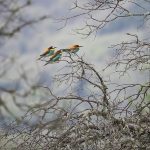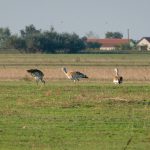 Of course there is much more to the American commons portfolio than mineral wealth waiting to be extracted, air and water resources eager to be bent to man’s will. Our dominion, as some describe it, extends over countless flora and fauna. Many of these species serve as commercial goods as components of textiles, construction, or dinner. Yet the ones that we’ve found no mercantile use for are just as important to our economy and the future of our commons as the ones we’ve been shrewd enough to exploit. We’re just not sure how yet.
Of course there is much more to the American commons portfolio than mineral wealth waiting to be extracted, air and water resources eager to be bent to man’s will. Our dominion, as some describe it, extends over countless flora and fauna. Many of these species serve as commercial goods as components of textiles, construction, or dinner. Yet the ones that we’ve found no mercantile use for are just as important to our economy and the future of our commons as the ones we’ve been shrewd enough to exploit. We’re just not sure how yet.
At issue is ecology, the complex interconnectedness of all living things. Many ecosystems exist in a precarious state of equanimity. Like one of those precarious towers built of Jenga blocks, it may afford the loss of a component or two, an insect here, a plant species there. But eventually, if pieces are pulled out one by one, it will collapse. Those who run this callous game of ecological destabilization play it just as if it were a round of Jenga: hope the tower doesn’t topple on your turn!
To protect the commons, you have to protect every part of it, even the inconvenient or obnoxious parts. We simply do not know enough to pick or choose what stays and what gets sacrificed to the altar of expediency. Understand this and you’ll understand why environmentalists are not the foes of industry they are made out to be, but rather shrewd managers with an eye towards long-term profits. It’s this simple. Those who protect the much maligned Spotted Owl don’t do it because they value an owl above humans (most of them, anyway!) or because they hate the timber industry. On the contrary, one protects the Spotted Owl because one loves the timber far more than any company whose business plan involves razing untold acres of productive forest. The loss of an owl species may not affect the natural balance of Northwestern forests a bit. On the other hand, its extinction could be the first tip of a domino in a violent cascade that would ultimately destroy those resources on which so many jobs depend. No one, not a single expert in any field today, can say exactly what could happen. So why risk it?
A corporation doesn’t have to care about such things. Despite facile protests about responsible stewardship and sustainability, a corporation’s first mandate is to deliver immediate, increasing profits to its shareholders. No company with a thought for the common good blows off mountain tops or contaminates the water table. People are people, but put one in charge of a business entity with limited liability and watch how fast human kindness and consideration is replaced by robot greed.
Aldo Leopold, sometimes called the father of wildlife ecology, was one of the first to understand that all is of a part. He elucidated the fragile connections between things, explaining in the simplest terms, as if to a child, that you cannot love game and hate predators, cannot conserve the waters and waste the ranges. Were the boards of every extractive, agricultural, and chemical industry well acquainted with his following quotation, would they be partners in the protection of our commons?
The last word in ignorance is the man who says of an animal or plant: “What good is it?” If the land mechanism as a whole is good, then every part is good, whether we understand it or not. If the biota, in the course of aeons, has built something we like but do not understand, then who but a fool would discard seemingly useless parts? To keep every cog and wheel is the first precaution of intelligent tinkering.











hi nice post, i enjoyed it